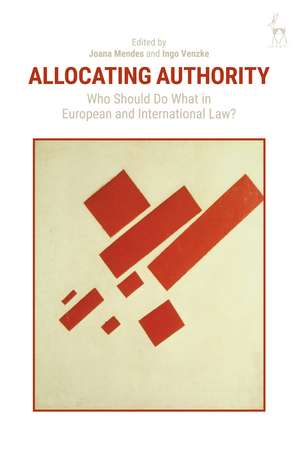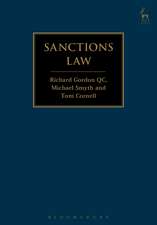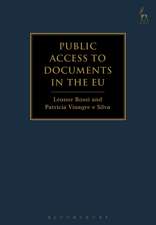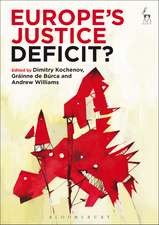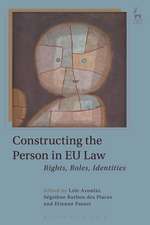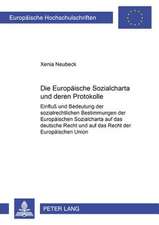Allocating Authority: Who Should Do What in European and International Law?
Editat de Professor Joana Mendes, Associate Professor Ingo Venzkeen Limba Engleză Paperback – 27 mai 2020
| Toate formatele și edițiile | Preț | Express |
|---|---|---|
| Paperback (1) | 272.14 lei 6-8 săpt. | |
| Bloomsbury Publishing – 27 mai 2020 | 272.14 lei 6-8 săpt. | |
| Hardback (1) | 569.60 lei 3-5 săpt. | |
| Bloomsbury Publishing – 10 ian 2018 | 569.60 lei 3-5 săpt. |
Preț: 272.14 lei
Preț vechi: 348.89 lei
-22% Nou
Puncte Express: 408
Preț estimativ în valută:
52.07€ • 54.66$ • 43.22£
52.07€ • 54.66$ • 43.22£
Carte tipărită la comandă
Livrare economică 10-24 aprilie
Preluare comenzi: 021 569.72.76
Specificații
ISBN-13: 9781509938223
ISBN-10: 1509938222
Pagini: 312
Dimensiuni: 156 x 234 mm
Greutate: 0.44 kg
Editura: Bloomsbury Publishing
Colecția Hart Publishing
Locul publicării:London, United Kingdom
ISBN-10: 1509938222
Pagini: 312
Dimensiuni: 156 x 234 mm
Greutate: 0.44 kg
Editura: Bloomsbury Publishing
Colecția Hart Publishing
Locul publicării:London, United Kingdom
Caracteristici
The editors draw on expertise from the world of European and international law.
Notă biografică
Joana Mendes is Professor of Comparative Administrative Law, University of Luxembourg.Ingo Venzke is Associate Professor of International Law, University of Amsterdam.
Cuprins
1. Introducing the Idea of Relative Authority Joana Mendes and Ingo VenzkePart I: Empirical and Normative Traction2. Democratic Legitimacy and Executive Rule-making: Positive Political Theory in Comparative Public Law Susan Rose-Ackerman3. In Search of a New Model of Checks and Balances for the EU: Beyond Separation of Powers Eoin Carolan and Deirdre Curtin4. Bolstering Authority by Enhancing Communication: How Checks and Balances and Feedback Loops can Strengthen the Authority of the European Court of Human Rights Mikael Rask Madsen5. Authority Monism in International Organisations: A Historical Sketch Jochen von Bernstorff6. No Institution is an Island: Checks and Balances in Global Governance Andreas von Staden Part II: Iterations in Practice7. The Role of the Court of Justice in Shaping the Institutional Balance in the EU Bruno De Witte8. Refining Relative Authority: The Judicial Branch in the New Separation of Powers Joseph Corkin9. Judicial Review of EU Administrative Discretion: How Far Does the Separation of Powers Matter? Dominique Ritleng10. First or Second Best? Judicial Law-making in European Private Law Chantal Mak11. Relative Authority in Global and EU Financial Regulation: Linking the Legitimacy Debates Maurizia De Bellis12. Relative Authority and Institutional Decision-making in World Trade Law and International Investment Law Diane A Desierto
Recenzii
Allocating Authority provides a timely and welcome collection of papers on an issue which is likely to feature heavily in any future reform debates in international and European contexts. This reviewer therefore recommends this text to international and European legal academics, practitioners and policy officers, particularly those working in the areas of constitutional law, administrative law and international economic law.
